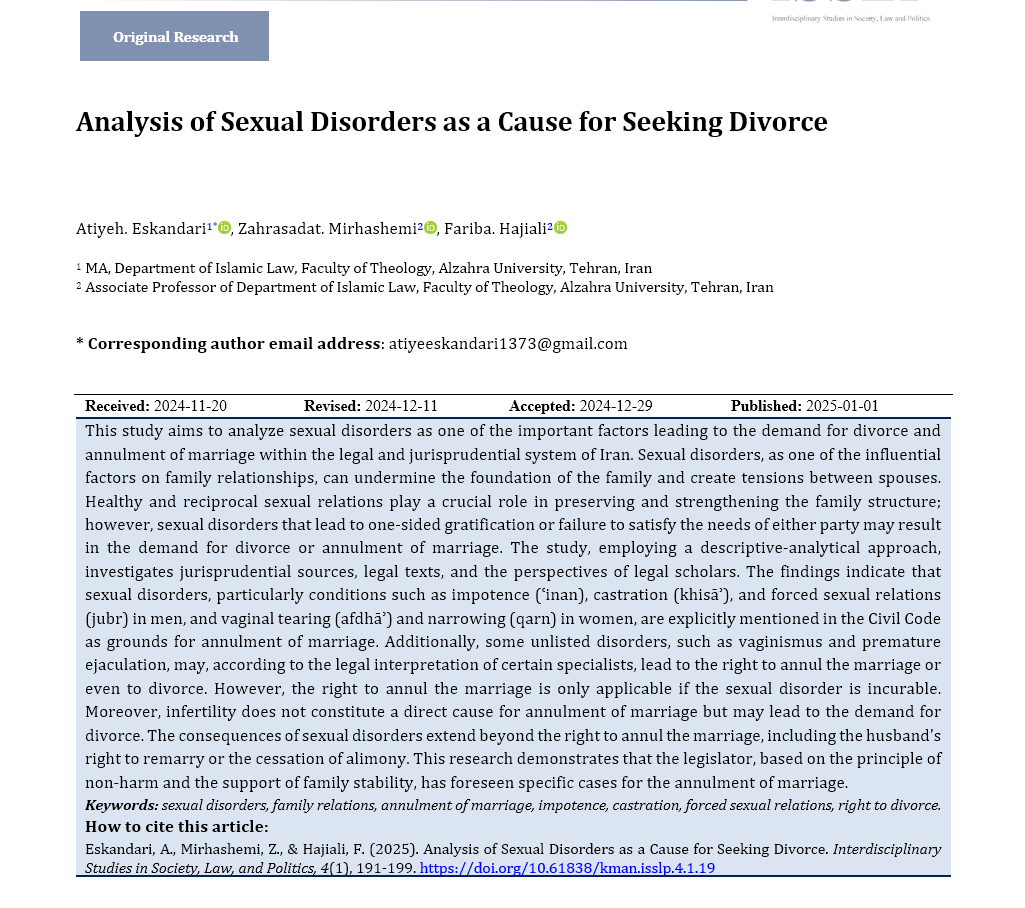Analysis of Sexual Disorders as a Cause for Seeking Divorce
Keywords:
sexual disorders, family relations, annulment of marriage, impotence, castration, forced sexual relations, right to divorceAbstract
This study aims to analyze sexual disorders as one of the important factors leading to the demand for divorce and annulment of marriage within the legal and jurisprudential system of Iran. Sexual disorders, as one of the influential factors on family relationships, can undermine the foundation of the family and create tensions between spouses. Healthy and reciprocal sexual relations play a crucial role in preserving and strengthening the family structure; however, sexual disorders that lead to one-sided gratification or failure to satisfy the needs of either party may result in the demand for divorce or annulment of marriage. The study, employing a descriptive-analytical approach, investigates jurisprudential sources, legal texts, and the perspectives of legal scholars. The findings indicate that sexual disorders, particularly conditions such as impotence (ʿinan), castration (khisāʾ), and forced sexual relations (jubr) in men, and vaginal tearing (afdhāʾ) and narrowing (qarn) in women, are explicitly mentioned in the Civil Code as grounds for annulment of marriage. Additionally, some unlisted disorders, such as vaginismus and premature ejaculation, may, according to the legal interpretation of certain specialists, lead to the right to annul the marriage or even to divorce. However, the right to annul the marriage is only applicable if the sexual disorder is incurable. Moreover, infertility does not constitute a direct cause for annulment of marriage but may lead to the demand for divorce. The consequences of sexual disorders extend beyond the right to annul the marriage, including the husband’s right to remarry or the cessation of alimony. This research demonstrates that the legislator, based on the principle of non-harm and the support of family stability, has foreseen specific cases for the annulment of marriage.
Downloads
References
Bakhshayesh, A., & Mortazavi, M. (2009). The Relationship Between Sexual Satisfaction, General Health, and Marital Satisfaction in Couples. Applied Psychology Quarterly, 3(12).
Emami, S. H. (2021). Civil Law. Islamiyah Bookstore.
Golpayegani, S. M. R. (2008). Majma' al-Masa'il. Dar al-Qur'an al-Karim Publishing.
Haeri, S. K. (2005). Defects Leading to Annulment of Marriage. Journal of Fiqh Ahl al-Bayt, 1(41).
Hilli, H. i. Y. (1984). Qawa'id al-Ahkam fi Ma'rifat al-Halal wa al-Haram. Islamic Publications Office affiliated with the Society of Seminary Teachers of Qom.
Jabal Ameli, J. (2016). Examining Marital Life Problems with an Emphasis on Sexual Relationships. Strengthening the Family System and Its Pathology, Qom.
Jahanfar, S., & Molaei Nejad, M. (2007). Textbook on Sexual Disorders. Jame Negar Publishing.
Katouzian, N. (2021). Family Civil Law. Ganj Danesh.
Katouzian, N. (2023). Introductory Course on Civil Law: Legal Acts and Contracts. Ganj Danesh.
Makarem Shirazi, N. (2016). New Istifta'at. Imam Ali ibn Abi Talib School Publications.
Mehrpour, H. (2008). A Jurisprudential and Legal Examination of the Different Status of Men and Women Regarding Marriage Annulment. Mofid Quarterly, 1(20).
Moein, M. (2009). Moein Persian Dictionary. Amir Kabir Publishing.
Najafi, M. H. (1989). Jawahir al-Kalam fi Sharh Sharayi' al-Islam. Dar al-Turath al-Arabi.
Nikkhoo, M. R., & Avadis Yans, H. (2008). Men's Sexual Life. Sokhan Publishing.
Nosh Abadi, A. (2005). Women and Methods of Attracting Spousal Affection. Payam-e Zan Magazine, 1(164).
Safaei, S. H., & Emami, A. (2021). Family Law. Mizan Publishing.
Shoayri, M. R. (2007). Human and Sexual Health: Diagnosis and Treatment of Sexual Disorders from a Psychological Perspective. Alborz.
Tusi, M. i. H. (1983). Al-Mabsut fi Fiqh al-Imamiyya. Al-Haydariyah Press.

Downloads
Additional Files
Published
Submitted
Revised
Accepted
Issue
Section
License
Copyright (c) 2025 Interdisciplinary Studies in Society, Law, and Politics

This work is licensed under a Creative Commons Attribution-NonCommercial 4.0 International License.





